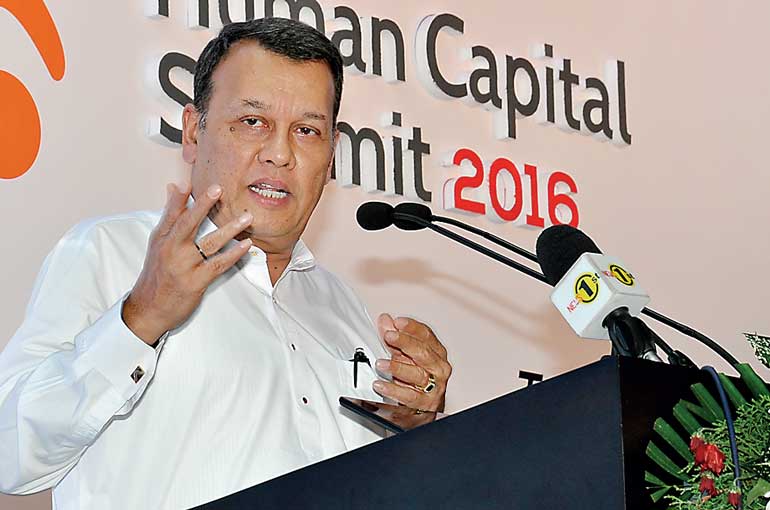Monday Feb 23, 2026
Monday Feb 23, 2026
Wednesday, 24 August 2016 15:52 - - {{hitsCtrl.values.hits}}
 Skills Development and Vocational Training Minister Mahinda Samarasinghe
Skills Development and Vocational Training Minister Mahinda Samarasinghe
In a bid to revive the technical and vocational colleges of the country, the Government had set its intention to integrate the National Vocational Qualification (NVQ) with the mainstream academic education certifications, a top Government Minister revealed at the recentlyconcluded Human Capital Summit. The Sri Lanka Human Resource Development Council estimates that the labour needs of the market are expected to grow up to 881,171 by 2020. If the country is to abide by this requirement, the technical and vocational colleges are an important part of the equation. Addressing the final session of the gathering, Ministry of Skills Development and Vocational Training Minister Mahinda Samarasinghe acknowledged the low recognition for the NVQ qualification as a major deterrent in attracting youth to technical colleges.
Under a new policy decision by the Cabinet, the NVQ level 3 and level 6 will be equalised to the G.C.E O/L and G.C.E A/L respectively. The Minister claimed that this was a revolutionary step and anticipates a significant increase in demand towards the technology stream as a result of this policy.
“When the student reaches the age of 16 he can take the decision, whether he want to go through the traditional education system or the technology stream. After finishing the NVQ level 6 they can enter the one of the technical universities. We also have taken the decision to shorten the number of years a technology stream student has to spend in obtaining a degree. If the person has the level 6 certificate within the period of two years a degree could be obtained,” said Samarasinghe. According to the International Labour Organization (ILO) around 150,000 youth join the labour force market without any training year each. The Government is also pursuing the idea of establishing a more equitable and inclusive education.
“We are multicultural society with strong ethnic and gender balance. Our education should reflect this diversity,” said Minister Samarasinghe. In highlighting the Government’s efforts towards this end, he pointed out that in initial batch of the Sri Lanka- German Technical Institute in Trincomalee, out of the 350 students, 27% were female. This is a unique characteristic as vocational colleges often tend to be dominated by males. Private sector participation in education policy is an imperative in a modern day economy. However in Sri Lanka policy planning in education has been mainly restricted within the Government. This has resulted in a major skills gap and inadequate supply for its growth industries.
“The bulk of the employment opportunities are offered by the private sector. In this context we must listen and understand what they (private sector) want,” said Samarasinghe. The Ministry of Skills Development and Vocational Training with the support of the World Bank and the Asian Development Bank (ADB) has set up four skill councils (tourism, construction, ICT, and light engineering) to bridge the skill gap experienced in these sectors. Through these councils the private sector has been given the reins to upgrade the quality of education in vocational institutes. English education in the country has been often hampered by the lack of qualified teachers, especially in rural areas.
“Many English teachers appointed in schools can’t speak English themselves, because they have been political appointments. In the previous Government 40,000 graduates were given employment and lot of them as English teachers,” said Samarasinghe. The Ministry has taken the steps in recruiting over 100 teachers with good knowledge of English and also retraining of teachers. Referring to the social utility in English education, Minister Samarasinghe professed: “If we do it properly, it will also help in bringing down social barriers that are inherent in our society.”